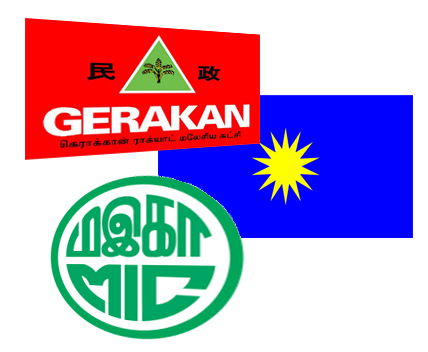 OVERALL, Pakatan Rakyat (PR) Members of Parliament (MPs) who were voted in in 2008 demonstrated much stronger support for the establishment of a Freedom of Information (FOI) Act compared with Barisan Nasional (BN) MPs.
OVERALL, Pakatan Rakyat (PR) Members of Parliament (MPs) who were voted in in 2008 demonstrated much stronger support for the establishment of a Freedom of Information (FOI) Act compared with Barisan Nasional (BN) MPs.
PR MPs, who were approached for The Nut Graph‘s MP Watch project, also showed better understanding of what a FOI Act is about. Fewer PR MPs confused freedom of information with freedom of speech and media freedom compared with BN MPs.
BN: Umno
Umno MPs appeared divided on the issue of freedom of information. Out of the 24 MPs who responded to the question, “Would you support a Freedom of Information Act? Why or why not?”, eight were very supportive of enacting a FOI Act. Three flatly refused the idea, while the rest either did not state their stand on the issue clearly, or confused freedom of information with freedom of speech. Two MPs refused to comment.
 Those who supported a FOI Act generally believed that the rakyat has the right to information, and that freedom of information would ensure greater government transparency and accountability.
Those who supported a FOI Act generally believed that the rakyat has the right to information, and that freedom of information would ensure greater government transparency and accountability.
Datuk Seri Azmi Khalid (Padang Besar) said the Official Secrets Act (OSA) should be abolished to allow for more transparency. Umno Youth chief Khairy Jamaluddin (Rembau) said having a FOI Act would “increase government transparency and accountability as well as reduce corruption across the board.” But he cautioned that private information and information that would jeopardise national security or criminal investigations should remain confidential.
In stark contrast, MPs like Datuk Hasan Malek (Kuala Pilah) and Datuk Abu Bakar Taib (Langkawi) said there was no need for a FOI Act because existing laws such as the OSA were sufficient to regulate the flow of information.
At least four Umno MPs, including Datuk Bung Moktar Radin (Kinabatangan) and Datuk Ronald Kiandee (Beluran), confused the concept of freedom of information with freedom of speech.
Additionally, seven other Umno MPs were ambiguous on the issue. Datuk Ismail Kasim (Arau), for example, opined that the Malaysian public was not yet mature enough to handle certain information. Datuk Razali Ibrahim (Muar) cautioned that a FOI Act may be abused by certain quarters with ill intentions.
BN: MCA, MIC and other component parties
 All nine MCA MPs who responded to MP Watch said they would support a FOI Act in the interest of transparency and accountability. They also echoed the opinion of some of their Umno counterparts that the FOI Act should have a caveat restricting access to national security matters.
All nine MCA MPs who responded to MP Watch said they would support a FOI Act in the interest of transparency and accountability. They also echoed the opinion of some of their Umno counterparts that the FOI Act should have a caveat restricting access to national security matters.
However, Datuk Seri Liow Tiong Lai (Bentong) stressed that the term “national security” had to be defined clearly. Datuk Dr Wee Ka Siong (Ayer Hitam) said such an Act was “good and timely” but should not be seen as “allowing intrusion into one’s privacy”.
Three out of the four MIC MPs were supportive of a FOI Act. Datuk M Saravanan (Tapah) said every citizen had the right to know about the day-to-day running of government. On the other hand, Datuk S Subramaniam (Segamat) was more cautious about having a FOI Act: “I’ve got no qualms about access to information on tenders being made public or about how the government manages its funds … It’s the more sensitive issues pertaining to religion, for example … where we have to be careful.”
MPs from other BN component parties like PBB, PBRS and Upko took a similar stand. They said they would support the Act but with reservations. Other MPs from Gerakan, PBS, PRS and LDP were ambiguous, and some again confused freedom of information with freedom of speech.
PR: PAS
 Almost all 18 PAS MPs who responded to MP Watch expressed their support for a FOI Act.
Almost all 18 PAS MPs who responded to MP Watch expressed their support for a FOI Act.
“Democracy is about voters making informed decisions … The more informed the rakyat is, the lesser the chance for the executive and those in the civil service to engage in corrupt practices…,” said Dr Dzulkefly Ahmad (Kuala Selangor).
Dr Lo’ Lo’ Mohamad Ghazali (Titiwangsa) added that the right to access information was guaranteed by the Universal Declaration of Human Rights.
Dr Mujahid Yusof Rawa (Parit Buntar) also said there was a need for consistency in the laws if a FOI Act was enacted. “[H]aving a Freedom of Information Act with other Acts that curb freedom still at large is a fruitless effort,” he said, referring to the OSA, the Printing Presses and Publications Act, and the Internal Security Act. [Editor’s note: The ISA has since been replaced with the Security Offences (Special Measures) Act.]
Only Datuk Dr Mohd Hayati Othman (Pendang) did not state clearly whether he would support a FOI Act.
PR: DAP
 All 22 DAP MPs who responded to MP Watch gave their full support for the establishment of a FOI Act.
All 22 DAP MPs who responded to MP Watch gave their full support for the establishment of a FOI Act.
“Any exceptions within the FOI Act should be made only in specific and defined areas of law enforcement, privacy, national security, business confidentiality, public or individual safety, and the effectiveness and integrity of government decision-making processes,” said Teresa Kok (Seputeh).
Charles Santiago (Klang), who successfully fought for the declassification of the Klang central bus station concession agreement, added that the right to information should be institutionalised in the country.
Teo Nie Ching (Serdang) also said that if a minister or civil servant wanted to categorise certain information as “secret”, he or she must justify the need to do so. Otherwise, everything should be made accessible to the public.
“Currently, everything is ‘rahsia’ unless stated otherwise. To me, everything should be accessible unless categorised otherwise,” she said.
Karpal Singh (Bukit Gelugor) commented that the OSA “protects government information absolutely” and was an affront to the country’s democratic process. “The penal consequences and penalties under the Official Secrets Act cannot be justified,” he noted.
PR: PKR
![]() Similar to the DAP, all 21 PKR MPs who responded to MP Watch said they would support a FOI Act. R Sivarasa (Subang) was in fact the first MP who tried to table in Parliament a private member’s bill on freedom of information, but without success.
Similar to the DAP, all 21 PKR MPs who responded to MP Watch said they would support a FOI Act. R Sivarasa (Subang) was in fact the first MP who tried to table in Parliament a private member’s bill on freedom of information, but without success.
Mohd Yusmadi Mohd Yusoff (Balik Pulau) said he envisaged an open and transparent government that practised the principle of “publish what you pay”. “If the government uses any taxpayers’ funds, they have to publish it,” he said. Mohd Yusmadi added that he rejected the regime of secrecy and the Big Brother concept of government.
William Leong Jee Keen (Selayang) cited the Bukit Antarabangsa landslide report as an example of information that was needlessly protected by the OSA. “Those who lost their relatives and friends or properties are entitled to know the cause of the landslide and to claim damages from those who were negligent,” said Leong.
Independents
All six independent MPs who took part in MP Watch supported the idea of a FOI Act.
“Free access to information should be the rule rather than the exception. This is to prove our commitment to the principle that the people are entitled to information so that they can make well-informed decisions, in line with the slogan ‘Rakyat Didahulukan’ or ‘Ketuanan Rakyat’,” said Zulkifli Noordin (Kulim–Bandar Baru).
Others like Michael Jeyakumar Devaraj from Parti Sosialis Malaysia said a FOI Act would help reduce corruption and abuse of power, as well as improve governance since citizens could monitor the government’s performance more effectively.
Promoting understanding

Centre for Independent Journalism, Malaysia (CIJ) director V Gayathry [Editor’s note: Gayathry is now the former CIJ executive director] attributes the low understanding and confusion about freedom of information among BN MPs to their generally lower understanding of democracy and human rights compared with PR MPs.
“These [concepts] are often seen as un-Asian and an incompatible way of life [by the majority of BN politicians] … [But] because the PR often uses democracy and justice as their reform platform, there is much better appreciation of freedom of information and other fundamental [democratic] freedoms,” says Gayathry.
She says the only way to correct the misconceptions is to organise briefings and trainings for MPs, and for the BN leadership to change the way it governs.
She adds that CIJ has conducted such training for political parties before. “We were also invited to brief Penang elected state representatives as [the state] is interested in enacting FOI law [like in Selangor],” says Gayathry.
On the observation that Umno MPs were less open to the idea of a FOI Act compared with their MCA and MIC counterparts, Gayathry says it might be because they have the most to lose in terms of power. “If Umno politicians were subjected to scrutiny, it could open up a can of worms on how they control information, decision making, and maybe even businesses. So, those who would be hurt the most would definitely be the most resistant,” she argues.
However, Gayathry stresses that freedom of information is a citizen’s fundamental right, and a FOI Act is necessary if democratic governance is to flourish and the people are to be empowered to make informed decisions and choices. ![]()
This essay first appeared exclusively in Understanding the Dewan Rakyat, together with other analyses on how our government works. The book also contains the profiles of the current 222 MPs and how they and their parties would vote on key issues of democracy. The book was launched by Speaker of the House Tan Sri Pandikar Amin Mulia at the Dewan Rakyat on 23 March 2011. It is available at PusatLoyarBurok.

